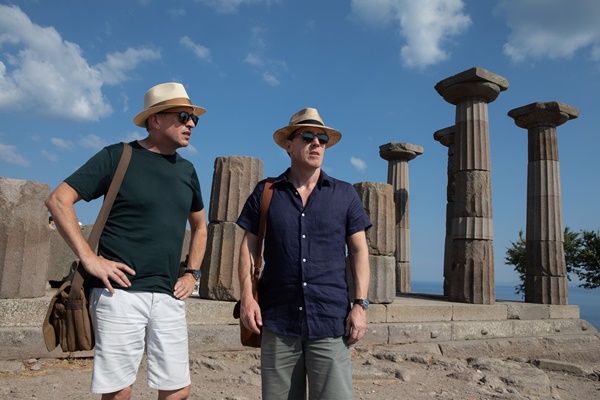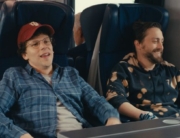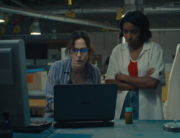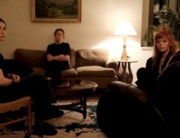
At this moment, there’s admittedly something envious about Steve Coogan and Rob Brydon’s travel exploits in The Trip to Greece. Driving around populated areas, eating at restaurants, simply standing less than three feet apart from one another: it’s amazing how much self-quarantining causes you to miss simple activities. That was never the movie’s intention, of course, but the aura of sadness and pathos surrounding its loose narrative oddly fits with our current predicament.
As the final entry in Michael Winterbottom’s “The Trip” films—a faux-docuseries starring Coogan and Brydon as fictionalized versions of themselves—there is a reoccurring sense of finality to their antics. Both men are older, in relationships, have kids, and seem kind of shocked that they keep going on these driving and dine-in trips. The location this time is Greece, with the duo retracing Odysseus’s legendary return voyage from Troy, starting in Turkey and working their way around the Mediterranean. This leads to a series of witty conversations and ego putdowns that help to conceal the underlying midlife crises plaguing these men over their various dinner conversations.
There’s a routine to Coogan and Brydon’s actions: visit a location, banter on about its architecture or history, followed by a meal and more conversation. There’s also a lot of moments where the duo perform character impressions, including Marlon Brando in The Godfather, Dustin Hoffman in Marathon Man, whether Heracles/Hercules would sound better as Werner Herzog rather than Schwarzenegger, all well done. Yet the voices aren’t as funny as the men’s routine attempts to one-up each other, seeing who can envision the more absurd scenario. These small and intimate moments make you believe these two have a believable history together—three movie’s worth already.
Yet the humor also lends itself to how Coogan and Brydon view each other at this point in their lives. Coogan displays a lot more knowledge of Greek mythology (not just because of his Percy Jackson & the Olympians movie role), always expositing details to Brydon who seems intent on discussing virtually anything else. Yet Brydon is the one more at ease, his domestication suggesting a lot more ego fulfillment compared to Coogan. Near the beginning, the two ask themselves what they’re most proud of. Brydon answers with his kids, while Coogan jokingly says his BAFTA awards, even though he too has a son. The actual punch line: Brydon doesn’t have any BAFTAs, but he has a life, which is a different kind of reward.
Visually, the fourth film in the series does well with its “Anthony Bourdain meets My Dinner with Andre” setup, with striking shots of Greek landscape and meals being cooked in restaurant kitchens. However, there are also a few surprising cinematic experiments: black-and-white dream sequences that revolve around Steve’s fears of his ill father. The Bergman/Lynch vibe is notable, but these feel a bit out of the blue. Maybe it’s because the characters are so blunt and biting in their dialogue exchanges that these cryptic dreams come across as jarring by comparison.
Still, there is something almost leisurely about this film that works in its favor. At its core is a story of two men who’ve been doing this schtick for a decade finally coming to terms with their age and insecurities, even if their egos remain strong. So when the film throws a surprising left hook into its story, it feels like one midlife crisis has reached its peak. This self-reflexivity is reminiscent of the Greek gods who, as Steve pointed out, were neither good nor “persona non grata” but just incredibly flawed individuals.
Much like its predecessors, The Trip to Greece is simply about friends embarking on a road trip, eating food, and having conversations. But it’s an exceedingly watchable, if not bittersweet, movie all the same, thanks to Coogan and Brydon’s dynamic chemistry. And from the view of everyone dealing with a pandemic, these two are experiencing a luxury they don’t even realize they have. Seems like a metaphor for life itself.






Leave A Comment